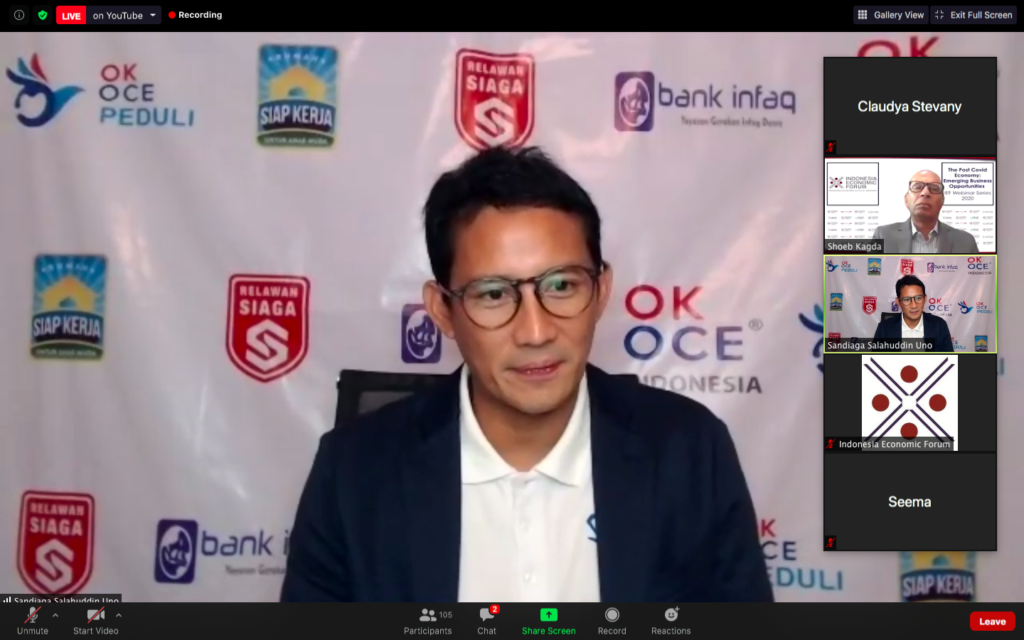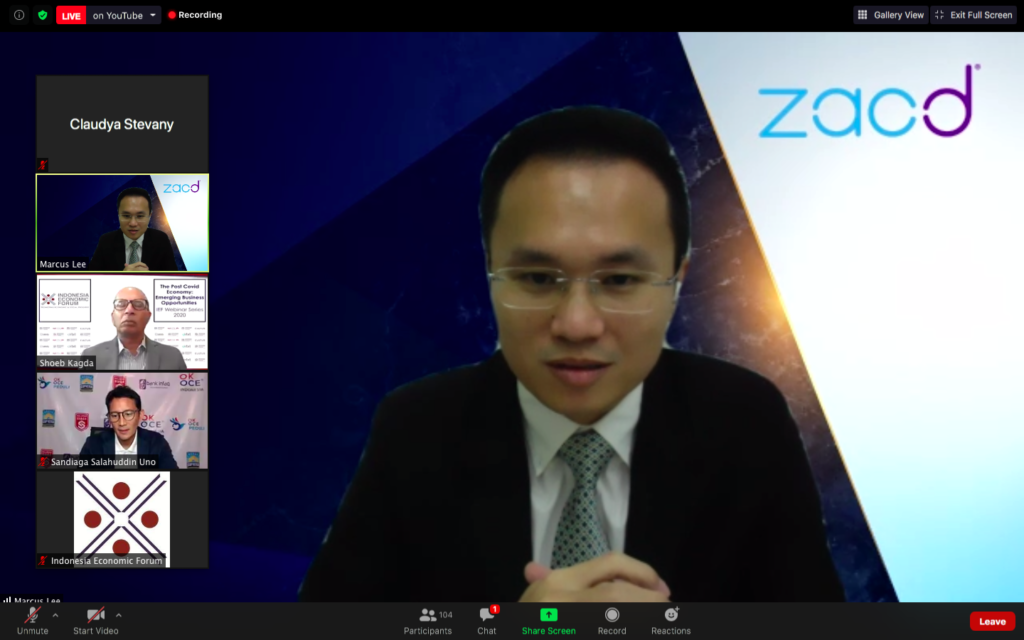Jakarta – The Indonesia Economic Forum in collaboration with ZACD, Synthesis Communications Indonesia, Orbit Future Academy and Chairos International Ventures presented the webinar Series titled “Emerging Business Opportunities post Covid-19: A Golden Age For Entrepreneurs?” with Sandiaga Uno, former vice government of Jakarta and a national entrepreneur as keynote speaker and Marcus Lee, Regional Director ZACD Group. This webinar discussion was moderated by Shoeb Kagda, Founder and CEO of the Indonesia Economic Forum.
The speakers shared their insights on how the Covid-19 pandemic has impacted business and emerging new opportunities for young entrepreneurs. Mr Uno also highlighted a number of growth sectors even in the midst of sharp economic downturn.
“We are living in unprecedented times. For the first time in decades, Indonesia may experience a contraction in GDP growth in 2020. However, in times of crisis, new opportunities emerge. According to the World Economic Forum, Covid-19 has also led to an increase in entrepreneurial activity around the world. Companies and individuals have rallied to respond to and where possible to tackle the crisis. Companies have pivoted to where the needs are such as carmakers turning their factories around to make ventilators,” said Shoeb Kagda.
“New ideas and innovations have emerged. Many entrepreneurs and start-ups have grabbed the opportunity to launch new businesses. If we walk the streets of Jakarta, for example, we can now see many tukang masker around. Online food providers are flourishing. Taxi companies are delivering groceries. Entrepreneurs do not stand around waiting for things to happen. They make things happen,” he added.
In his presentation, Sandiaga Uno noted that the Covid-19 pandemic had hit small and medium sized companies (SMEs) harder that in the past. In the first quarter of 2020, the country’s GDP growth slowed to 2.9 percent, the lowest in nearly 20 years and contracted by 3 percent in the second quarter as the government imposed large-scale social distancing (PSBB) measures. As a result, household spending and SMEs were negatively impacted.

Compared to the Asian Financial Crisis in 1998 and the global financial crisis of 2008, when SMEs proved resilient and provided the backbone for economic recovery, this time SMEs were knocked down in the early stages of the pandemic. Most SMEs recorded zero percent growth in terms of sales, resulting in massive layoffs. And given the fact that SMEs account for 98 percent of total employment, the impact on unemployment was huge as between 10 million to 15 million Indonesians lost their jobs.
Against this backdrop, the government’s initiatives to boost the national economy through SME credit restructuring programs have not been successful. The government has allocated Rp900 trillion for the program but to date less than 1% has been disseminated.
“The bureaucracy is slow and inefficient which has hampered progress,” Mr Uno said. “There is a lot of room for improvement and President Joko Widodo has been urging his ministers to work harder.”
The question posed to Mr Uno was how can SMEs adapt and respond to the situation? He outlined three pillars.
First impose tight financial controls and focus on conserving cash reserves. “In the current environment cash is king and SMEs should consider rescheduling debt payments to ensure that they have sufficient liquidity to run their business.”
Secondly, adopt to the new “new normal” and the stay at home economy. SMEs should target online communities especially those companies that have relied heavily on offline sales channels in the past. He described sectors such as ecommerce and logistics as winning or defensive sectors in the Covid-19 world with others such as electronics, telecommunications and entertainment as those that have adopted fastest to the new normal.
“Indonesians are watching Korean drama series on Netflix and Iflix. We should be producing our own Batak, Javanese and Bugis drama series to take advantage of the new stay home trends,” he noted. “I also receive frozen foods everyday from suppliers asking me to promote their products so definitely food delivery will be growth business.”
Thirdly, he encouraged companies to work through their ecosystems and focus on selling to their network using Instagram, WhatsApp and other social media platforms. “Use existing systems such as resellers and drop shippers instead of trying to set up your own outlets,” he said. “But we also need the government to step in and provide liquidity.”
Other growth sectors he identified include clean energy and energy conservation technologies especially in urban areas. Online education and courses also provide huge opportunities for entrepreneurs and SMEs. “When I was travelling the country during the last presidential and vide presidential elections, I met 250,000 face to face over nine months but over the past three months under lockdown I have already engaged with 300,000 individuals so definitely people are comfortable with online.”
He added that online education also provides an opportunity to increase the country’s graduate student rate from the current 11 percent to 25 percent, thus closing the gap with other G-20 nations.
“I see several developments that will lead to permanent behavior changes among consumers for example in finance, hygiene and travel,” he said. “But what I learned during the pandemic is keep learning and be pro-active in attending webinars to learn from experts. Take this opportunity to improve and invest in yourself. Do not waste this crisis.”
Meanwhile, Marcus Lee, Regional Director ZACD Group stressed that in the midst of this crisis, it is the right time for entrepreneurs to showcase their business ideas to investors. Currently investors are also seeking new investment opportunities that offer steady revenue streams and higher internal rate of return (IRR).

“At the moment investors are more defensive and focused on two keywords: higher IRR and steady revenue stream. But it’s the moment for Indonesian entrepreneurs to meet face to face with more investors, offer business proposals. And one other keyword is: partnership. We at ZACD are always open to partner with Indonesian entrepreneurs and we are committed to do it for long term, not only for one or two years,” Mr Lee said.

